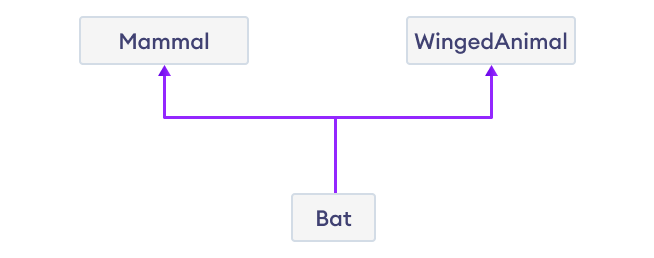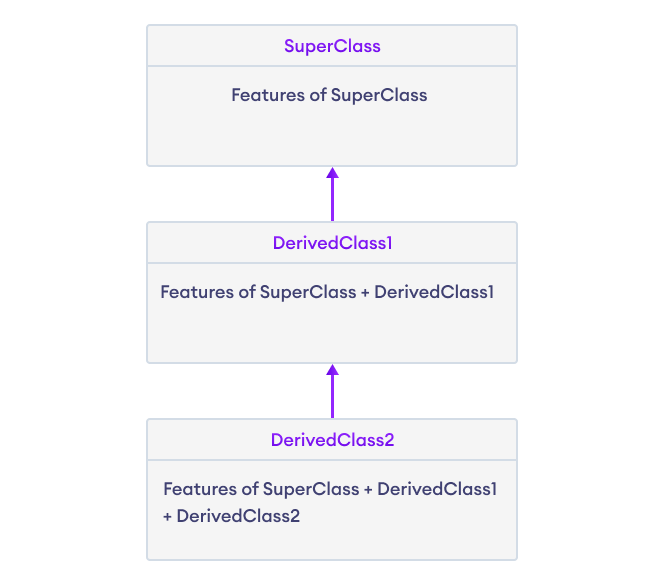A class can be derived from more than one superclass in Python. This is called multiple inheritance.
For example, a class Bat is derived from superclasses Mammal and WingedAnimal. It makes sense because bat is a mammal as well as a winged animal.

Python Multiple Inheritance Syntax
class SuperClass1: # features of SuperClass1 class SuperClass2: # features of SuperClass2 class MultiDerived(SuperClass1, SuperClass2): # features of SuperClass1 + SuperClass2 + MultiDerived class Here, the MultiDerived class is derived from SuperClass1 and SuperClass2 classes.
Example: Python Multiple Inheritance
class Mammal: def mammal_info(self): print("Mammals can give direct birth.") class WingedAnimal: def winged_animal_info(self): print("Winged animals can flap.") class Bat(Mammal, WingedAnimal): pass # create an object of Bat class b1 = Bat() b1.mammal_info() b1.winged_animal_info() Output
Mammals can give direct birth. Winged animals can flap.
In the above example, the Bat class is derived from two super classes: Mammal and WingedAnimal. Notice the statements,
b1 = Bat() b1.mammal_info() b1.winged_animal_info() Here, we are using b1 (object of Bat) to access mammal_info() and winged_animal_info() methods of the Mammal and the WingedAnimal class respectively.
Python Multilevel Inheritance
In Python, not only can we derive a class from the superclass but you can also derive a class from the derived class. This form of inheritance is known as multilevel inheritance.
Here's the syntax of the multilevel inheritance,
class SuperClass: # Super class code here class DerivedClass1(SuperClass): # Derived class 1 code here class DerivedClass2(DerivedClass1): # Derived class 2 code here Here, the DerivedClass1 class is derived from the SuperClass class, and the DerivedClass2 class is derived from the DerivedClass1 class.

Example: Python Multilevel Inheritance
class SuperClass: def super_method(self): print("Super Class method called") # define class that derive from SuperClass class DerivedClass1(SuperClass): def derived1_method(self): print("Derived class 1 method called") # define class that derive from DerivedClass1 class DerivedClass2(DerivedClass1): def derived2_method(self): print("Derived class 2 method called") # create an object of DerivedClass2 d2 = DerivedClass2() d2.super_method() # Output: "Super Class method called" d2.derived1_method() # Output: "Derived class 1 method called" d2.derived2_method() # Output: "Derived class 2 method called" Output
Super Class method called Derived class 1 method called Derived class 2 method called
In the above example, DerivedClass2 is derived from DerivedClass1, which is derived from SuperClass.
It means that DerivedClass2 inherits all the attributes and methods of both DerivedClass1 and SuperClass.
Hence, we are using d2 (object of DerivedClass2) to call methods from SuperClass, DerivedClass1, and DerivedClass2.
Method Resolution Order (MRO) in Python
If two superclasses have the same method (function) name and the derived class calls that method, Python uses the MRO to search for the right method to call. For example,
class SuperClass1: def info(self): print("Super Class 1 method called") class SuperClass2: def info(self): print("Super Class 2 method called") class Derived(SuperClass1, SuperClass2): pass d1 = Derived() d1.info() # Output: "Super Class 1 method called" Here, SuperClass1 and SuperClass2 both of these classes define a method info().
So when info() is called using the d1 object of the Derived class, Python uses the MRO to determine which method to call.
In this case, the MRO specifies that methods should be inherited from the leftmost superclass first, so info() of SuperClass1 is called rather than that of SuperClass2.
Also Read:
